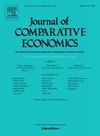National identity, public goods, and modern economic development
IF 3.1
2区 经济学
Q1 ECONOMICS
引用次数: 0
Abstract
Since the Industrial Revolution, large-scale economic development has coincided with the rise of the modern nation-state. We argue that this is not a coincidence. We show how the advent of national identity helped modern states overcome internal conflicts over the distribution of economic benefits to provide public goods and grow. Using a model with elites and commoners, characterized initially by distinct group identities (e.g., ethnicity, class), we show that elites have an incentive to induce commoners to identify with the nation. The more widespread is national identification, the less is conflict between elites and commoners, and the more revenues can be collected and public goods broadly provided. This effect is self-reinforcing: the greater is public goods provision, the greater is the economic status of the nation and thus the psychological return on national identification. Elites’ incentives to induce national identification, however, depend on the presence of political restraints on the elite. We reexamine the historical cases of England (1600–1920) and the United States (1865–present), identifying support for our framework therein.
国家认同、公共产品与现代经济发展
自工业革命以来,大规模的经济发展与现代民族国家的兴起不约而同。我们认为这不是巧合。我们展示了民族认同的出现如何帮助现代国家克服经济利益分配的内部冲突,以提供公共产品并实现增长。利用精英和平民的模型,我们发现,精英有动机诱导平民认同国家。精英和平民最初以不同的群体身份(如种族、阶级)为特征。国家认同越广泛,精英和平民之间的冲突就越少,就能获得更多的收入,并广泛提供公共产品。这种效应是自我强化的:公共产品提供得越多,国家的经济地位就越高,从而国家认同的心理回报也就越高。然而,精英诱导国家认同的动机取决于对精英的政治约束的存在。我们重新审视了英国(1600-1920)和美国(1865年至今)的历史案例,以确定其中对我们的框架的支持。
本文章由计算机程序翻译,如有差异,请以英文原文为准。
求助全文
约1分钟内获得全文
求助全文
来源期刊

Journal of Comparative Economics
ECONOMICS-
CiteScore
4.40
自引率
0.00%
发文量
66
审稿时长
45 days
期刊介绍:
The mission of the Journal of Comparative Economics is to lead the new orientations of research in comparative economics. Before 1989, the core of comparative economics was the comparison of economic systems with in particular the economic analysis of socialism in its different forms. In the last fifteen years, the main focus of interest of comparative economists has been the transition from socialism to capitalism.
 求助内容:
求助内容: 应助结果提醒方式:
应助结果提醒方式:


